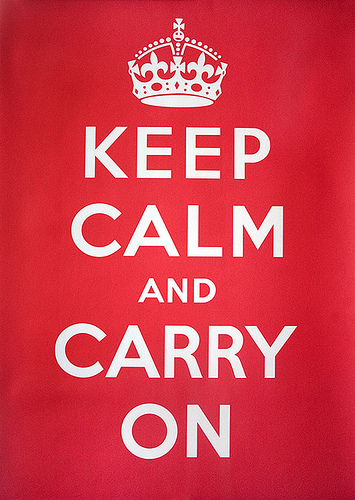A man who suffers before it is necessary, suffers more than is necessary. – Seneca
 What does that mean?
What does that mean?
Today’s quote is a compliment to Aristotle’s quote, which says “Fear is pain arising from the anticipation of evil.” If you are suffering before it is necessary, you are anticipating the suffering. That means you suffer before than it actually is necessary, and therefore, longer than necessary.
Usually, I have found that my extra suffering is usually anxiety based on lack of knowledge. Other people I know are simply prone to worry. Entire philosophies are based on simply letting the inevitable happen, and not worry about the things in life that cannot be changed.
Why is being calm important?
Calmness helps us to experience emotions without being caught up in them. By being calm, we can prevent many of the negative thoughts from gaining traction and spinning off into nightmare land. In this manner we can help diminish the early suffering.
Calmness also allows us to observe what is happening, instead of dreading what might happen. This allows us to use our minds to search for ways to either evade or minimize the suffering. This is probably a better use of our time than being absorbed in worry and dread.
Where can I apply this in my life?
While some level of anxiety or worry seems to be part of life, we can work to minimize it. Perhaps at the level of a Zen Master, we can get there, but in the mean time, let’s try to move that direction.
The biggest problem I have with “suffering before it is necessary” is getting emotionally caught up in what is about to happen, or that I am anticipating. The emotions are what do me in. For me, the trick is to minimize the emotional content.
I do that by taking whatever visions of disaster I may be imagining and minimize them. Make them black and white, then go from a movie to a series of pictures (like a comic book), and then from actual images to cartoon type drawings. Muffle the sound, then drop the volume to zero. Take the images and fade them to a uniform gray. It works for me, how well does it work for you?
Sometimes, when the dread is a bit smaller, I can simply dismiss it and move straight to logic. Logic is where things get a little less scary. With logic, you can ask questions and seek answers. Typical questions are about how to avoid or minimize the suffering.
Logic can also help you examine the approaching suffering and attempt to be somewhere else when it arrives. If that is impossible, you can put some thought into how to minimize the impact of the suffering, or how to better handle what suffering is unavoidable.
As an example, in prior economic downturns, I have been laid off. These layoffs were often a source of dread. While I sometimes spent quite a bit of time wallowing in self-pity or living in fear, I also spent some time using logic. I saved money and began being frugal well in advance and have yet to have to move back in with my parents. 8)
In a similar situation, some people end up in a state of denial or in terror of the possibility of being laid off. Does that state of mind help their situation, or does it make it worse? Are they suffering only as much as is necessary, or are they suffering early, and therefore more than necessary? Does the quote make a little more sense now?
Think of a few things that worry you, possible outcomes from which you are anticipating a less-than-spectacular result. What specifically is it about these situations that bothers you? Take some time and think about what you might be able to do to help yourself cope with these situations, should things go badly. What we are trying to do is to get ahead of the dread of suffering (the emotional reaction), and get the logic rolling before the emotion gets a chance to overwhelm you.
Are there images that you are seeing on a regular basis? What might that mean to you, and how might you deal with the images? If you have a regular (favorite isn’t really the right word) image of suffering, you might look into the truth of the situation. If you’re worried about losing your job and your house and family and living under a bridge, you might be able to do some research into programs to help with temporary housing, counseling and family services. It may still happen, but you can now feel some certainty that there is only a remote chance for the worst-case scenario.
Logic will win over emotion, if you can keep emotion from getting too big of a head start. Keeping calm will help slow the emotion down, and give logic a chance to get going. As the Brits said, “keep calm and carry on”. Sound advice, don’t you think?
From: Twitter, @philo_quotes
confirmed at : http://www.brainyquote.com/quotes/quotes/l/luciusanna155055.html
Photo by emilydickinsonridesabmx






